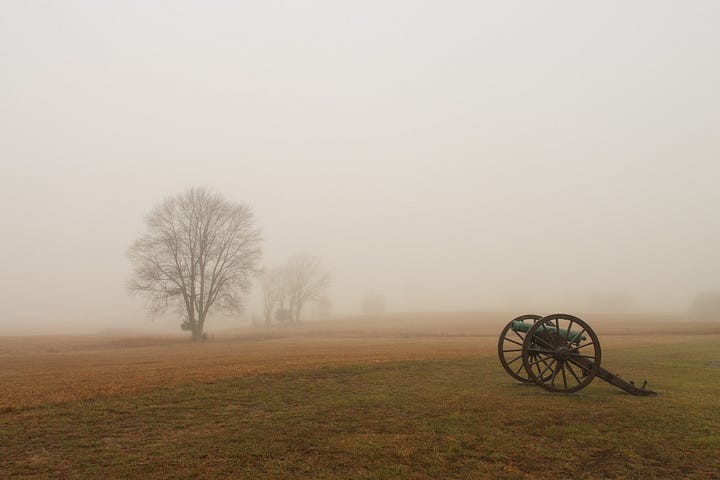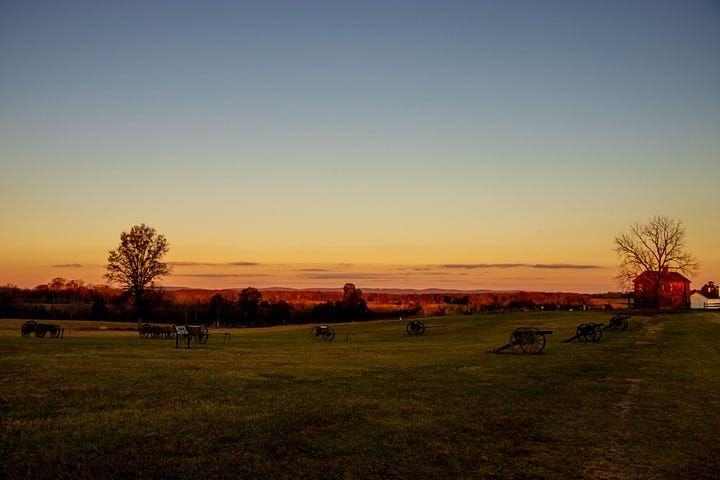Making Sense of the World Around Me
A reflection on the composition and podcast "Quartet for the End of Time"
(Note this is the first of two posts from today - rest this one first and the second will make more sense)…
I am grateful for moments of clarity. These two images are from two consecutive days from roughly the same location at roughly the same time of day. Obviously, one is foggy and the other clear. These are from Wednesday and Thursday of last week at the Manassas Battlefield in Virginia.
I had several beautiful hikes around the battlefield while I was in Virginia for Thanksgiving and I wasn’t sure what the photos I received were speaking until I listened to Rob Bell’s latest podcast on Monday. It was entitled “Quartet for the End of Time” and it was a reflection upon his taking in a performance of a composition called “Quatuor pour la fin du temps.” It was originally composed by Olivier Messiaen, who was a French POW during World War II. The piece was first performed on January 15, 1941 on piano, cello, clarinet, and violin in a Nazi POW camp in Poland. After listening to the podcast, I took an hour or so listening to a recording of this piece.
The podcast is a wonderful listen but there was one part at the end that was especially striking. Bell shared said that the performers spoke of how, in composing the piece, Messiaen was using his art to help make sense of the world around him. In a time that likely felt like the end of time, in a place that might have felt similarly, Messiaen wrote a piece of music that likely reflects what he and the world around him was experiencing. Bell then went further to talk about how so much of art does this same thing and how, even if we don’t consider ourselves to be artists, we can do the same. He noted how Messiaen crafted this piece out of scrounged paper and pencils in a prison camp and then Bell shared about sitting after the performance ended and thinking about “all the people everywhere like me trying to make sense of the world. Trying to make your way in all this sadness and disappointment and despair and all of what is part of this experience we call being a human. And the power of what happens when we respond to it with ‘what do you want to make? What do you want to try? What do you want to give yourself to with whatever bits and pieces and fragments of energy or resolve or impetus you might have.’”
Making sense of the world around me...this really helped to bring clarity to a lot of things for me today. It took me back to ten years ago when this new stage of my life began (For more on that, click here ) and how a lot of things in my life at that time didn’t make a lot of sense. I find that I have come, ten years later, to a place of seeing that finding and sharing what I see in the world is a way that I work to make sense of the world for me. What it has helped me to do is find ways to balance hope/beauty/joy/etc with the challenges that life brings of grief/fear/pain. It doesn’t eliminate the challenges and difficulties but instead helps to bring balance so those challenges are not what overwhelms. These things may not resolve the questions and uncertainties but they help to be able to move through and with them.
Take a listen to the podcast and then take a listen to the composition. Both speak beautifully and powerfully. Links are below. But first a few questions...
What is in your life that helps you to move through the uncertainties of life? What helps you to make sense of the world around you?
A Quartet for the End of Time - The Robcast (Rob Bell Podcast)
A Quartet for the End of Time - Youtube performance from St Thomas University in Houston (2011)





This is my immediate take on the Quartet. It very possibly makes little sense nor would it be technically correct. Instinctually, I committed to "Quartet" before I listened to Rob Bell's take on it (which was a bit too chaotic to follow at the pace I usually require). Musicology is not my particular forté, but the performance piqued many associations of which my limited analysis could identify in terms of structure and influence.
It also invited nostalgia from elementary and middle school music classes where Mr. Frisch invited us to share with the class what the classic piece conjured for us. A fond experience...
Coming full circle, the seemingly effortless associations between emotional extremes reflecting the marching of time, yet peaceful denouement, allows some respite. But, for this newfound piece, it is pleading to be further studied.